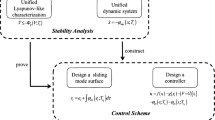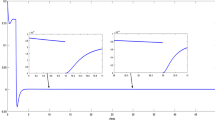Abstract
In this paper, the problem of robust synchronization and fault detection for a class of master-slave systems subjected to some nonlinear perturbations and mixed neutral and discrete time-varying delays is investigated based on an H ∞ performance condition. By introducing a descriptor technique, using Lyapunov-Krasovskii functional and a suitable change of variables, new required sufficient conditions are established in terms of delay-dependent linear matrix inequalities to synthesize the residual generation scheme. The explicit expression of the synchronization law is derived for the fault such that both asymptotic stability and a prescribed level of disturbance attenuation are satisfied for all admissible nonlinear perturbations. A numerical example with simulation results illustrates the effectiveness of the methodology.
Similar content being viewed by others
References
G. Chen and X. Dong, “On feedback control of chaotic continuous-time systems,” IEEE Trans. Circuits and Systems, vol. 40, pp. 591–601, 1993.
Y. Sun, J. Cao, and Z. Wang, “Exponential synchronization of stochastic perturbed chaotic delayed neural networks,” Neurocomputing, vol. 70, no. 13, pp. 2477–2485, Aug. 2007.
Y. Wang, Z. Wang, and J. Liang, “A delay fractioning approach to global synchronization of delayed complex networks with stochastic disturbances,” Physics Letters A, vol. 372, no. 39, pp. 6066–6073, 2008.
H. R. Karimi and H. Gao, “New delay-dependent exponential H ∞ synchronization for uncertain neural networks with mixed time-delays,” IEEE Trans. on Systems, Man and Cybernetics, Part B, vol. 40, no. 1, pp. 173–185, 2010.
J. Cao, Z. Wang, and Y. Sun, “Synchronization in an array of linearly stochastically coupled networks with time delays,” Physica A, vol. 385, no. 2, pp. 718–728, 2007.
L. M. Pecora and T. L. Carroll, “Synchronization in chaotic systems,” Physical Review Letters, vol. 64, pp. 821–824, 1990.
A. L. Fradkov and A. Y. Pogromsky, “Speed gradient control of chaotic continuous-time systems,” IEEE Trans. on Circuits and Systems I: Fundamental Theory and Applications, vol. 43, no. 11, pp. 907–913, 1996.
H. Gao, J. Lam, and G. Chen, “New criteria for synchronization stability of general complex dynamical networks with coupling delays,” Physics Letters A, vol. 360, no. 2, pp. 263–273, 2006.
H. R. Karimi and P. Maass, “Delay-range-dependent exponential H ∞ synchronization of a class of delayed neural networks,” Chaos, Solitons & Fractals, vol. 41, no. 3, pp. 1125–1135, 2009.
G. Wen, Q. G. Wang, C. Lin, X. Han, and G. Li, “Synthesis for robust synchronization of chaotic systems under output feedback control with multiple random delays,” Chaos, Solitons & Fractals, vol. 29, no. 5, pp. 1142–1146, 2006.
Y. Y. Hou, T. L. Liao, and J. J. Yan, “Synchronization of chaotic systems using output feedback control design,” Physics A, vol. 379, pp. 81–89, 2007.
H. Lu and C. van Leeuwen, “Synchronization of chaotic neural networks via output or state coupling,” Chaos, Solitons and Fractals, vol. 30, pp. 166–176, 2006.
T. L. Liao and S. H. Tsai, “Adaptive synchronization of chaotic systems and its application to secure communication,” Chaos, Solitons and Fractals, vol. 11, no. 9, pp. 1387–1396, 2000.
M. Feki, “An adaptive chaos synchronization scheme applied to secure communication,” Chaos, Solitons and Fractals, vol. 18, pp. 141–148, 2003.
Y. W. Wang, C. Wen, Y. C. Soh, and J. W. Xiao, “Adaptive control and synchronization for a class of nonlinear chaotic systems using partial system states,” Phys. Letters. A, vol. 351, no. 1–2, pp. 79–84, 2006.
A. L. Fradkov and A. Y. Markov, “Adaptive synchronization of chaotic systems based on speed gradient method and passification,” IEEE Trans. on Circuits and Systems I: Fundamental Theory and Applications, vol. 44, no. 10, pp. 905–912, 1997.
A. L. Fradkov, H. Nijmeijer, and A. Markov, “Adaptive observer-based synchronization for communications,” Int. J. Bifurcation and Chaos, vol. 10, no. 12, pp. 2807–2813, 2000.
J. H. Park, “Synchronization of Genesio chaotic system via backstepping approach,” Chaos Solitons and Fractals, vol. 27, pp. 1369–1375, 2006.
J. J. Yan, M. L. Hung, T. Y. Chiang, and Y. S. Yang, “Robust synchronization of chaotic systems via adaptive sliding mode control,” Physics Letters A, vol. 356, no. 3, pp. 220–225, 2006.
L.-G. García-Valdovinos, V. Parra-Vega, and M. A. Arteaga, “Observer-based sliding mode impedance control of bilateral teleoperation under constant unknown time delay,” Robotics and Automation Systems, vol. 55, no. 8, pp. 609–617, 2007.
C. Cai and G. Chen, “Synchronization of complex dynamical networks by the incremental ISS approach,” Physica A, vol. 371, pp. 754–766, 2006.
R. J. Patton, P. M. Frank, and R. N. Clark, Issues of Fault Diagnosis for Dynamic Systems, Springer, Verlag, Berlin, 2000.
L. Bai, Z. Tian, and S. Shi, “Robust fault detection for a class of nonlinear time-delay systems,” J. Franklin Institute, vol. 344, pp. 873–888, 2007.
L. Bai, Z. Tian, and S. Shi, “Design of H ∞ robust fault detection filter for linear uncertain time-delay systems,” ISA Transactions, vol. 45, no. 4, pp. 491–502, 2006.
M. Basin, J. Rodriguez-Gonzalez, and R. Martinez-Zuniga, “Optimal control for linear systems with time delay in control input,” J. Franklin Institute, vol. 341, pp. 267–278, 2004.
H. R. Karimi, M. Zapateiro, and N. Luo, “A linear matrix inequality approach to robust fault detection filter design of linear systems with mixed timevarying delays and nonlinear perturbations,” J. of The Franklin Institute, vol. 347, pp. 957–973, 2010.
J. K. Hale and S. M. Verduyn Lunel, Introduction to Functional Differential Equations, Springer-Verlag, New York, 1993.
H. R. Karimi, “Observer-based mixed H 2/H ∞ control design for linear systems with time-varying delays: An LMI approach,” Int. J. Control, Automation, and Systems, vol. 6, no. 1, pp. 1–14, 2008.
H. R. Karimi and H. Gao, “LMI-based delaydependent mixed H 2/H ∞ control of second-order neutral systems with time-varying state and input delays,” ISA Transactions, vol. 47, no. 3, pp. 311–324, 2008.
H. R. Karimi, M. Zapateiro, and N. Luo, “Robust mixed H2/H ∞ delayed state-feedback control of neutral delay systems with time-varying delays,” Asian J. Control, vol. 10, no. 5, pp. 571–582, 2008.
F. Qiu, B. Cui, and Y. Ji, “Further results on robust stability of neutral system with mixed time-varying delays and nonlinear perturbations,” Nonlinear Analysis: Real World Applications, vol. 11, pp. 895–906, 2010.
P. M. Frank and X. Ding, “Survey of robust residual generation and evaluation methods in observer-based fault detection systems,” J. Process Control, vol. 7, pp. 403–424, 1997.
V. Venkatasubramanian, R. Rengaswamy, K. Yin, and S. N. Kavuri, “A review of process fault detection and diagnosis part I: quantitative modelbased methods,” Computers and Chemical Eng., vol. 27, pp. 293–311, 2003.
H. Yang and M. Saif, “Observer design and fault diagnosis for state-retarded dynamical systems,” Automatica, vol. 34, pp. 217–227, 1998.
S. X. Ding, M. Zhong, B. Tang, and P. Zhang, “An LMI approach to the design of fault detection filter for time-delay LTI systems with unknown inputs,” Proc. American Control Conference, pp. 2137–2142, 2001.
M. Zhong, S. X. Ding, J. Lam, and H. Wang, “An LMI approach to design robust fault detection filter for uncertain LTI systems,” Automatica, vol. 39, pp. 543–550, 2003.
B. Jiang, M. Staroswiecki, and V. Cocquempot, “Fault identification for a class of time-delay systems,” Proc. American Control Conference, pp. 2239–2244, 2002.
P. Zhang, S. X. Ding, G. Z. Wang, and D. H. Zhou, “Fault detection for multirate sampled-data systems with time-delays,” Int. J. Control, vol. 75, pp. 1457–1471, 2002.
N. Meskin and K. Khorasani, “Robust fault detection and isolation of time-delay systems using a geometric approach,” Automatica, vol. 45, pp. 1567–1573, 2009.
S. X. Ding, T. Jeinsch, P. M. Frank, and E. L. Ding, “A unified approach to the optimization of fault detection systems,” Int. J. Adaptive Control and Signal Processing, vol. 14, pp. 725–745, 2000.
Author information
Authors and Affiliations
Corresponding author
Additional information
Recommended by Editorial Board member Young Soo Suh under the direction of Editor Jae Weon Choi.
Hamid Reza Karimi was born in 1976, and is a Full Professor in Control Systems at the Faculty of Engineering and Science of the University of Agder in Norway. His research interests are in the areas of nonlinear systems, networked control systems, robust control/filter design, time-delay systems, wavelets and vibration control of flexible structures with an emphasis on applications in engineering. Dr. Karimi is a senior member of IEEE and serves as chairman of the IEEE chapter on control systems at IEEE Norway section. He is also serving as an editorial board member for some international journals, such as Mechatronics, International Journal of Control, Automation and Systems, Journal of Innovative Computing Information and Control-Express Letters, and International Journal of Control Theory and Applications, Nonlinear Dynamics and System Theory, etc. He is a member of IEEE Technical Committee on Systems with Uncertainty, IFAC Technical Committee on Robust Control and IFAC Technical Committee on Automotive Control. He was the recipient of the Juan de la Cierva Research Award in 2008, Alexander-von-Humboldt-Stiftung Research Fellowship in 2006, German Academic Exchange Service (DAAD) Research Fellowship in 2003, etc.
Rights and permissions
About this article
Cite this article
Karimi, H.R. Robust synchronization and fault detection of uncertain master-slave systems with mixed time-varying delays and nonlinear perturbations. Int. J. Control Autom. Syst. 9, 671–680 (2011). https://doi.org/10.1007/s12555-011-0408-8
Received:
Revised:
Accepted:
Published:
Issue Date:
DOI: https://doi.org/10.1007/s12555-011-0408-8




